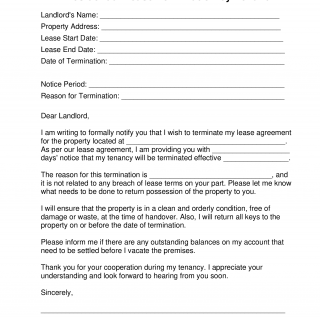Residential Lease Termination Letter
A residential lease termination letter is a document used to formally end a rental agreement between a landlord and a tenant. There are two types of termination letters: one by the landlord and the other by the tenant.
When writing a landlord termination letter, it is essential to state the reason for the termination and the date the tenant must vacate the premises. The letter should include details such as the address of the rental property and the landlord's contact information. It's also crucial to mention any outstanding financial obligations that the tenant may have and provide instructions on how to return the keys and leave the property in good condition. Landlords should ensure that they follow all legal requirements when ending a tenancy, such as providing adequate notice based on state laws.
Residential Lease Termination Letter by Landlord
Dear [Tenant's Name],
I am writing to inform you that I have decided to terminate your residential lease agreement, effective [Date of Termination]. As your landlord, it is my right to terminate the lease agreement with proper notice, and I am providing you with [Notice Period] days' notice.
The reason for terminating your lease agreement is that I plan to use the property for personal use. Please note that this decision is not related to any breach of lease terms on your part.
In accordance with our lease agreement, you are required to surrender the premises in a clean and orderly condition, free of damage or waste, on or before the date of termination mentioned above. You must also make arrangements to return all keys to me by that date.
If there are any outstanding balances on your account, please make sure to settle them before vacating the premises. Failure to do so may result in legal action being taken against you.
Please let me know if you have any questions or concerns regarding this matter. Thank you for your cooperation during your tenancy, and I wish you all the best in your future endeavors.
Sincerely,
[Landlord's Name]
On the other hand, a tenant termination letter should specify the date they intend to move out and the reason for ending the lease. Tenants can use this letter to request their security deposit's return and to confirm any final rent payments or utility bills. They should also provide their forwarding address so that the landlord can send them any necessary documents, such as the security deposit refund check.
It is important to note that tenants should adhere to the terms of the lease agreement and provide sufficient notice as required under state law. Failure to do so may result in additional fees or legal action.
Residential Lease Termination Letter by Tenant
Dear [Landlord's Name],
I am writing to inform you that I will be terminating my lease agreement for the rental property located at [Property Address]. As per the terms of our agreement, I am required to provide [Number of Days] days' notice before vacating the premises. Therefore, my last day of occupancy will be on [Date of Move-Out].
I have thoroughly enjoyed my residency at the property and appreciate your cooperation during my stay. To ensure a smooth transition, I will make sure to leave the property in good condition and schedule a time for your inspection.
Please advise me on the next steps to follow regarding the return of my security deposit and any other necessary arrangements.
Thank you for your understanding and cooperation.
Sincerely, [Your Name]
When writing either type of termination letter, it is crucial to keep a copy for personal records and attach any relevant documentation, such as photos of the property's condition or receipts for repairs made during the tenancy. This documentation can serve as evidence if there are any disputes over the condition of the property or any financial issues.
Overall, a properly written residential lease termination letter can help ensure a smooth transition for both parties and avoid unnecessary legal battles. However, it's essential to follow all legal requirements, provide sufficient notice, and maintain open communication with the other party to avoid any misunderstandings or disputes.
Strengths:
- Provides a formal and documented way to end a rental agreement.
- Helps avoid misunderstandings or disputes between landlords and tenants.
- Can help ensure a smooth transition for both parties.
Weaknesses:
- Failure to follow legal requirements may result in additional fees or legal action.
- The termination letter may not be sufficient evidence in court without supporting documentation.
Opportunities:
- Can serve as a template for future rental agreements.
- Allows landlords and tenants to maintain a positive relationship by ending the tenancy on mutually agreed-upon terms.
Threats:
- Failure to adhere to the terms of the lease agreement may result in financial penalties or legal action.
- Disputes over the condition of the property or outstanding financial obligations can cause strain on the landlord-tenant relationship.
Alternative forms:
- Verbal agreement (not recommended).
- Mediation or arbitration services (if disputes arise).
Submitting and storing the letter: The letter should be submitted via certified mail or delivered in person with a signature confirmation. Both parties should keep a copy of the termination letter for their records. It's also essential to store any supporting documentation in a safe location, such as a file cabinet or cloud-based storage platform.

